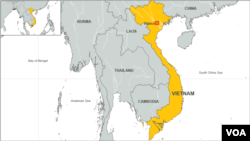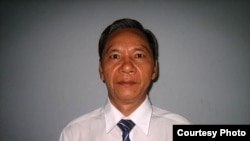Senior religious leaders of five major faiths in Vietnam have issued a joint statement calling on Hanoi to live up to President Truong Tan Sang’s recent pledge that his government fully respects human rights.
While meeting President Barack Obama in Washington last month, the Vietnamese president nopted that Hanoi and Washington have different views about human rights, but he said human rights are highly respected in Vietnam.
Leaders of the Buddhist, Catholic, Protestant, Cao Dai and Hoa Hao faiths in Vietnam have rejected Sang’s version of events. In a statement issued Wednesday, they listed a great number of ongoing human-rights abuses in Vietnam, affecting freedom of religion and expression and other basic human rights.
Pastor Nguyen Manh Hung of the Binh Tan Mennonite Church in Vietnam said the statement covered a wide range of human rights issues.
"The statement asks Hanoi to put its words into action," the cleric said, "by releasing prisoners of conscience, by suspending Decree 72, which curbs freedom of speech and restricts information sharing on social media, and by allowing international observers into the country."
The religious leaders called on the Vietnamese people to speak up to assert their basic rights, and to protect those who risk their lives to defend human rights and promote democracy.
The government has not responded to or commented on the statement. Public declarations critical of the government are rare in Vietnam, which òften detains those who voice opposition to the communist government's policies.
Internet activists and human-rights groups criticized Hanoi last week over a new decree that attempts to ban social media users and bloggers from posting information, including news stories, online.
Decree 72, which was approved by Prime Minister Nguyen Tan Dung in July, states that blogs and social media sites in Vietnam should only be used to share or exchange personal information.
The law, which goes into effect September 1, says such sites are "not allowed to quote, gather or summarize information from press organizations or government websites."
While meeting President Barack Obama in Washington last month, the Vietnamese president nopted that Hanoi and Washington have different views about human rights, but he said human rights are highly respected in Vietnam.
Leaders of the Buddhist, Catholic, Protestant, Cao Dai and Hoa Hao faiths in Vietnam have rejected Sang’s version of events. In a statement issued Wednesday, they listed a great number of ongoing human-rights abuses in Vietnam, affecting freedom of religion and expression and other basic human rights.
Pastor Nguyen Manh Hung of the Binh Tan Mennonite Church in Vietnam said the statement covered a wide range of human rights issues.
"The statement asks Hanoi to put its words into action," the cleric said, "by releasing prisoners of conscience, by suspending Decree 72, which curbs freedom of speech and restricts information sharing on social media, and by allowing international observers into the country."
The religious leaders called on the Vietnamese people to speak up to assert their basic rights, and to protect those who risk their lives to defend human rights and promote democracy.
The government has not responded to or commented on the statement. Public declarations critical of the government are rare in Vietnam, which òften detains those who voice opposition to the communist government's policies.
Internet activists and human-rights groups criticized Hanoi last week over a new decree that attempts to ban social media users and bloggers from posting information, including news stories, online.
Decree 72, which was approved by Prime Minister Nguyen Tan Dung in July, states that blogs and social media sites in Vietnam should only be used to share or exchange personal information.
The law, which goes into effect September 1, says such sites are "not allowed to quote, gather or summarize information from press organizations or government websites."






